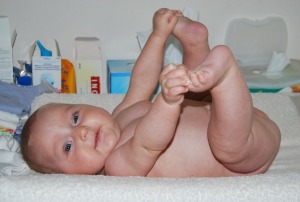
Cognitive development in the first six months of life
There’s every indication babies start developing awareness of their surroundings long
before they’ve made their grand entrance into the world. Studies have shown newborns
can tell their mother’s amniotic fluid from a stranger’s and it’s well known they prefer
the sound of their mother’s voice over any other.
It all points to the fact their tiny brains have started developing, growing and even
thinking from the earliest stages of their lives and that all-important cognitive
development which is defined as the ability to taste, hear, touch, smell, think, learn
language and eventually even talk, starts well before they can walk.
Cause and Effect
A baby’s brain develops quickly in their first six months and one of the first things they
begin to understand is the cause and effect relationship between certain events. Cry and
Mommy picks her up and the sound of your familiar voice heading down the hall means
you’ll be with her soon. These future heads of state, doctors and lawyers only have a
limited memory capacity in that first year, so they tend to live in the moment and that’s
why they are so easily distracted.
Babies start to learn about themselves around this time and the term proprioception refers
to discovering different parts of the body, where they are in space and in relation to each
other. Of course, every parent will want to know what they can do to speed the process
along and be positive influencers in their children’s early cognitive development.
Reading to Newborns
The experts say reading to newborns is a positive step. They won’t understand the
words but bright colors, interesting patterns and, of course, the sound of their mother’s
voice is just the kind of sensory stimulation they need in these early stages of cognitive
development.
The experts still stand by the traditional mobile as one of the best ways to spur on
development and a plastic unbreakable mirror in or near the crib will allow baby to see
her face and movements. Although there is a parting of ways when it comes to deciding
whether a baby learns simply because their brain is wired for it or whether these little
bundles of joy get educated through experience, researchers that study these areas agree
on two important points:
Neural Connections
Babies do a tremendous amount of learning in the first six to 12 months and interactions
with the people who look after them is critical. Secondly, the experiences they have
are vital to the neural connections that get alternately fixed and lost. There’s even hard
evidence cognitive development starts as early as in the first two months of life when
baby has learned to process enough information to imitate the facial expressions of those
around them.
Spatial perception starts to improve in months three or four and by months five and six,
your child’s personality is emerging and they become frustrated if favorite toys are taken
away. Your baby will even start making links between the words you associate with
objects at this age.
For more articles related to childcare please visit our Blog.
Author: Rob Starr